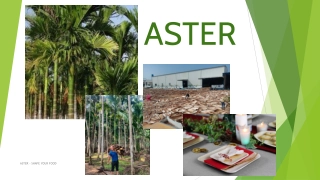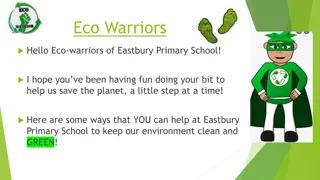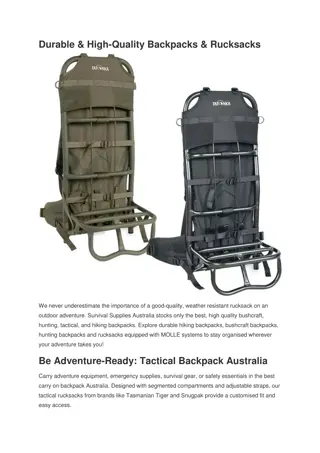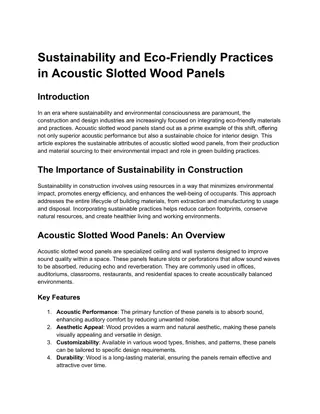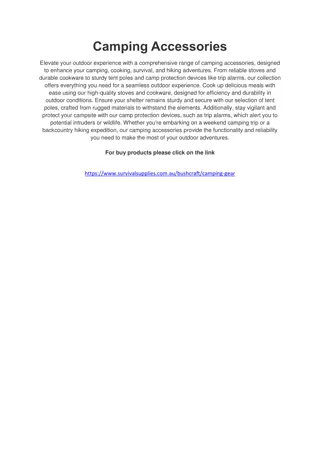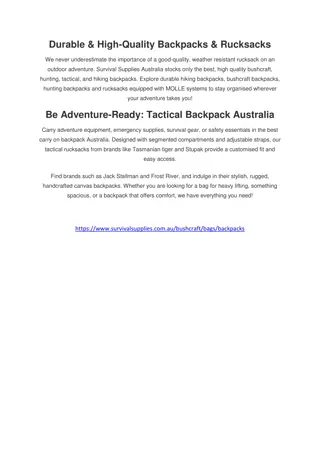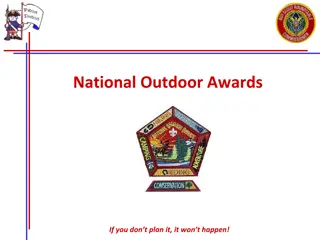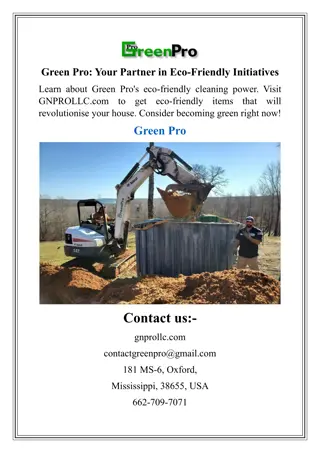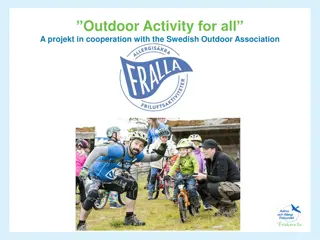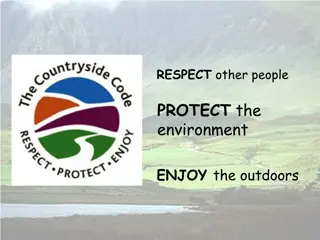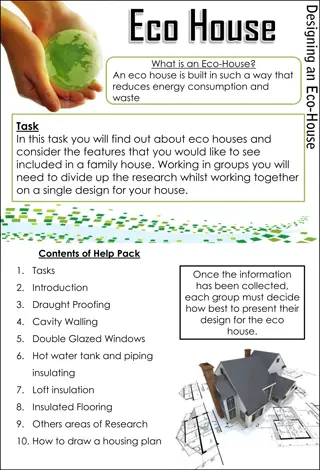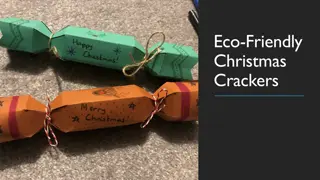Responsible Outdoor Practices for Eco-Friendly Hiking
Learn about responsible hiking practices to protect the environment, wildlife, and your safety while exploring the wilderness. From using GPS devices for communication to proper waste disposal and campsite selection, follow these tips to minimize your impact on nature and ensure a safe outdoor experience.
Download Presentation

Please find below an Image/Link to download the presentation.
The content on the website is provided AS IS for your information and personal use only. It may not be sold, licensed, or shared on other websites without obtaining consent from the author. Download presentation by click this link. If you encounter any issues during the download, it is possible that the publisher has removed the file from their server.
E N D
Presentation Transcript
1 2 Your group planned for this weekend s backcountry hike, a plan that included using a GPS satellite communication device. This hike plan and the scheduled check-ins will ensure that your group will be located quickly if you get lost, which protects the environment, too! Take a rest this turn. Bad move! You didn t check with a ranger before you left on your hike and the location where you planned to get water is dry! This could have been avoided if you had called to check on the water conditions. Remove one brown block. 3 4 What a tough situation! Your family chose a hike without checking the difficulty level, and your little sister is having the worst time trying to keep up. She has developed blisters and is crying, and your great hike has turned into a miserable day on the trail. You really wanted to get a cool wildflowers picture for your Instagram, but you went off trail because you didn t pack a map before you went! You accidentally create a social trail, which others follow, and continue the erosion process. Remove one green block. Remove one brown and one green block.
5 6 Good job, team! You hiked from one camp to another on an established trail and in single file line. This helps to protect the vegetation in the area from trampling, which also protects the wildlife in the area. What a pickle! Your group hikes in to a first come, first served campground only to discover all the available sites are taken. It is miles to the next campground, and everyone is exhausted, so the group makes a campsite for the night, a big no-no. Remove two green blocks. You can take a rest this turn. 7 8 Your group arrives at a location with existing campsites but chooses to make a new campsite instead of using one of the already impacted sites. This increases the amount of damage to this location. A member of your group decided the fastest way to the top was by cutting the switchbacks on the trail. This causes erosion, which could destroy the trail. Remove one brown block. Remove one green block.
9 10 Your group is hiking through the forest and encounters a big puddle in the trail. Rather than walking through the middle, you walk around the outside, which widens the trail and tramples the plants along the outside of the trail. Your group is running behind schedule getting to the stopping point for the day, so they decide to walk single file across a meadow instead of taking the trail around or meadow walking. Bad move! Remove two green blocks. Remove one brown and one green block. 11 12 Your family did a great job with washing their dinner dishes during an overnight camping trip, but they didn t strain the wastewater before broadcasting it over a broad area. The tiny pieces of food waste in the water attracted animals. Great job! You used a bear canister to keep your food secure. Bears and other animals are very food motivated, and using a canister means your food is protected from a being stolen by a clever animal. Enjoy your lunch! You can take a rest this turn. Remove one green block.
13 14 Great job shopping for your next campout, but a lot of these food items could have been repackaged to leave some of the trash at home. Repackaging food reduces the chance of accidentally leaving waste in an outdoor location. You gave it your best effort, but you really have to go, and your cathole isn t quite deep enough. Your toilet paper can be seen peeking out from the dirt. Waste must be buried at least 6 to 8 inches deep for the best chances of decomposition. Remove one green and one brown block. Remove one brown block. 15 16 The campers in the campsite next to yours didn t put their food away last night and the raccoons came to visit! Oh no! There s trash everywhere and they ve been asked to leave by the rangers for their careless behavior. Way to go! You used your cell phone camera to take pictures of the beautiful wildflowers on the trail and left the flowers for others to see. This is a great way to interact with nature and make memories. Remove two green blocks. You can take a rest this turn.
17 18 You found a beautiful rock on your hike and took it home with you, and it now sits in a box where no one sees it not even you! Natural items are best appreciated when they are found in the area where they belong. Your little brother always insists on looking for a hiking stick while on the trail. If too many people do this, it strips the land of natural cover and shelter for insects and small animals. It is a better idea to bring your own hiking stick. Remove one brown block. Remove one green block. 19 20 Bad move! You saw that there were cairns (rock piles) others had left to mark their trail and thought it would be a good idea to make one, too. These piles can confuse other hikers and aren t a useful way to mark the trail. A member of your group found an arrowhead in a historic area and put it in his pocket. Taking artifacts from a historic site isn t just bad for the preservation of the history of that location, it is also against federal law! Remove one green and one brown block. Remove two green blocks.
21 22 You did a great job going to www.readyforwildfire.org to secure your annual fire permit, but you decided to gather firewood at your campground, which depletes the local resources. A better idea is to purchase bundles of local wood from the camp host or local store. Great job with building a mound fire! You were able to limit how much wood you burned to just what you needed, and you returned the soil when you were done. This helped keep the soil healthy so that life can continue to grow in this area. You can take a rest this turn. Remove one green block. 23 24 Oh no! Your group collected rocks and built a new fire ring in an area that already has a designated fire ring! Building a new ring sterilizes the dirt, increases the chance of a wildfire, and confuses other campers into using a non-designated area for their campfires. Bad move! A member of your group decided to burn their trash in the fire never a good idea. The paper in food packaging is filled with chemicals that become toxic when burned, and unburned trash can draw wildlife into your campsite. Remove one brown and one green block. Remove one brown block.
25 26 Yikes! Your group didn t check fire regulations before you went camping and built a fire in an area with a burn ban! The ranger saw the smoke and is NOT happy the fire conditions are primed for a bad fire season! Great job using your camera to observe wildlife from a respectful distance! This allows animals to display their normal behavior, which makes watching them much more enjoyable. Take a break this turn. Remove two green blocks. 27 28 Your group is having a great time and sings a popular song while walking along the trail. It s breeding season, and several birds get scared and abandon their nests, which means fewer baby birds this year. You chose to bring your puppy with you to the preserve near your town because you want to train him for the trail. Sadly, you didn t put him on a leash, and he barked and chased the squirrels all morning. Remove one green block. Remove one brown block.
29 30 Great job bringing a bear bag and rope to hang it, but nobody in your group had ever hung a bear bag before! The bag wasn t secured correctly, and a bear got into your food. A bear canister would have been a better choice for the skill level of your group. Your group pitches their tents near the water and plays all day at the edge of the lake. This restricts the access the wildlife in the area to an important water source. Remove one green and one brown block. Remove two green blocks. 31 32 Your group learned about trail etiquette and followed the trail courtesy guidelines on the trail. Everyone is talking about the great group that was respectful and knew who had the right of way. Good job! Your group is having a great time hiking on the trail, and it shows there s a lot of shouting and rough play. This is impacting the quality of the experience of the people you are sharing the trail with. Remove one green block. You can take a rest this turn.
33 34 Your family brought your new puppy with you on your campout, but nobody took responsibility for picking it his waste and your fellow campers are upset about the poop piles everywhere. Oh no! One of the hikers in your group uses a wireless speaker to broadcast their music instead of letting nature s sounds prevail. Remove one green and one brown block. Remove one brown block. 35 36 You ve done a generally good job of being respectful on the trail, but your tents are brightly colored and so are your clothes. People go into the wilderness to seek solitude, and all those bright colors remind them that you are there, too. You are sad to see someone has carved their name into a tree. Hikers seriously damage trees when they carve into the bark. Remove two green blocks. Remove two green blocks.
1 2 3 4 5 6 8 9 7 10 12 11 14 12 15 17 16 18 20 19 21 23 22 24
1 2 3 4 5 6 8 9 7 10 12 11 14 12 15 17 16 18 20 19 21 23 22 24






